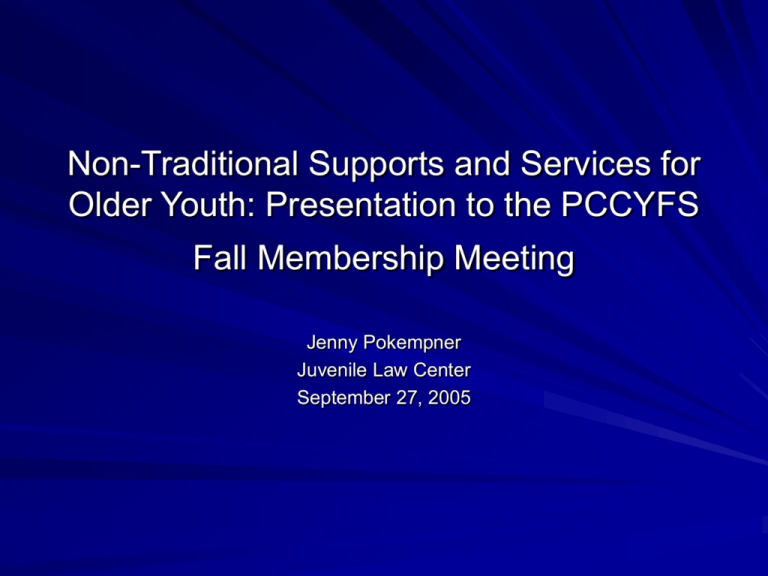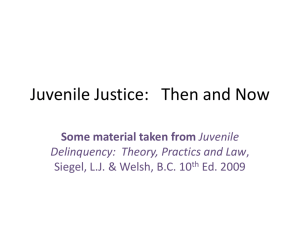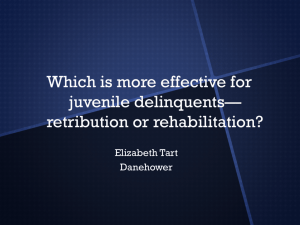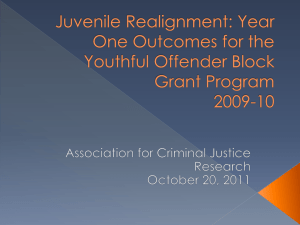Non-Traditional Supports and Services for Older Youth
advertisement

Non-Traditional Supports and Services for Older Youth: Presentation to the PCCYFS Fall Membership Meeting Jenny Pokempner Juvenile Law Center September 27, 2005 Why do we need increased supports and services for older youth? When they leave care they are experiencing high rates of: Homelessness Unemployment Low educational achievement (low rates of HS completion and GED, pursuit of post-secondary education) Early child-bearing Incarceration Dependence on public assistance What do We Know about where Older Youth Are Placed? (2001) 24% were in group homes 31% were in institutional settings 36% were in kinship or foster homes 5.4% were in Supervised Independent Living Placements 1.3% were runaways .4% were in pre-adoptive homes 1.4% were on trial home visits What do We Know About How Older Youth Learn to be Independent? Through experience--by doing (and making mistakes) Step-by-step (responsibility and freedom increased gradually over time) When they have the consistent support of some adult When they have stability and safety in their lives What Does the Law Require for Older Youth In Care? Reasonable Efforts must be made to achieve permanency (ASFA, Juvenile Act) Youth must be placed in the least restrictive, most family like placement (ASFA, Juvenile Act) IL services must be provided to youth at age 16 (ASFA, Juvenile Act) What Does the Law Require for Older Youth In Care? IL services must be provided to youth who were in care at 16 until age 21 (Chafee Act) Youth can stay in care until age 21 if they are in a program of instruction or treatment (Juvenile Act) What Does This Mean for Providers? Reasonable Efforts to Achieve Permanency and Least Restrictive, Most Family-Like Placement How Can Providers Enhance the Opportunity for Permanency (in Traditional and Non-traditional Ways)? Special recruitment of adoptive and foster homes for older youth Creation of specialized support for these caretakers Specialized Support could take the form of a collaborative of experts from various providers receiving TA from the IL Project (University of Pittsburgh) able to train and respond to the needs of families Create a continuum of placement types within your agency (group, foster, transitional living placement, supervised independent living placements) that mirror adolescent development Create standards of practice and rules in your placements that are age-appropriate Provider created continuum allows youth to experience more consistency and establish more lasting relationships Recruitment of mentors who can provide consistency and support throughout placement Creation of an alumni group and/or participation in YAB that can provide peer counseling Successful programs partner with a church or company that has a stable membership and will have a stake in continuing with the program Tools You Can Use A. SWAN Services Child specific recruitment Child profile (can help find placement and mentoring resources) Child preparation (can be used to prepare for APPLA or emancipation/independence) B. Understanding Reimbursement Structure to Aid in Creation of Continuum TLP and SILS are reimburseable by the state at about the same cost as foster care and are often less expensive to run SIL services are also reimburseable by the state and can be used to complement Chafee funds which are small C. Use Existing Programs to Increase Staff and Adult Support Foster Grand Parent Program State Contact: Mary Strasser 215-597-2806 www.seniorcorps.gov Americorp Volunteers: www.nationalservice.gov To Achieve Permanency Discharge Planning Must be Effective Discharge, like all dispositions, should serve the youth's best interest and promote safety, permanence, and wellbeing All discharges should be consistent with meeting the established permanency goal A Permanency Plan at Discharge Should Include – Stable source of income – Stable housing – Education and employment – Health and mental health care – Health insurance coverage – Connection with family and/or caring adults – Connection with community resources Tools You Can Use A. Know resources and systems in the “Adult World” mental health mental retardation homeless prevention system (for housing, not shelter) public benefits (MA, TANF, GA) public/subsidized housing system B. Partner with Agencies that can Provide Concrete Resources for Youth Big Brothers/Big Sisters Churches/companies Local housing authority Community or housing development agencies that are more familiar with applying for supportive housing funds, but can use your expertise in case management C. Learn About Other Funding Sources Needs Based Budget process (Luzerne and York) McKinney Vento Homeless Assistance Funds County Housing Trust funds TANF (for mother/baby placements) Runaway and Homeless Youth Act funds Foundations (recent interest in this age group—Jim Casey Youth Opportunity Initiative, Youth Transition Funders Group, Andrus Family Fund) D. Use Your Board Members Use expertise of board members, particularly in the area of housing development, low-income tax credits E. Use The Child Advocate If there is not an appropriate discharge plan, the child advocate should make an issue of this in court. Appropriate services or a discharge planning meeting can be ordered by the court. II. Provision of Independent Living Services Must be provided with Independent Living Services at least at age 16 and recorded at each permanency review (Adoption and Safe Families Act, Juvenile Act) Independent Living Services must be provided to youth who were in care until age 21 (Chafee) The Foster Care Independence Act (FCIA or Chafee Act) 42 U.S.C.A. § 677 (1999) Provides more funding for IL services and expanded the types of services that must be provided Each county must submit a FCIA plan Youth must be included in the planning process The county’s FCIA plan is public information. You can a request a copy from the IL coordinator or from DPW FCIA Requires States To Provide IL services to youth up until age 21, even after discharged from care Provide IL services to youth with disabilities to address their special needs Involve youth in the development of IL services and planning Allocate funds to train foster parents and caregivers on working with older youth FCIA Allows States To Use up to 30% of their FCIA funds to provide room and board for youth who have aged out of care Extend Medicaid coverage to youth who’ve aged out of care until age 21 – BUT Pennsylvania has not done this yet Education and Training Grant In 2002, FCIA was amended to provide vouchers for post-secondary education and training for IL youth. Youth may be eligible for up to $5000 in grants to cover costs not covered by existing grants Applications are available on www.indepdendentlivingpa.org Tools You Can Use A. Participate in county IL planning process B Be aware of IL services/curriculum offered so it can be reinforced within the placement setting—enlist the IL workers and/or the IL Project/CBT to help with this C. Get involved in your county’s needsbased budget planning process—IL services are reimburseable by the state (Chafee funds rarely the demand) D. Utilize and Collaborate with All Agencies and Programs that Provide IL Services to Eligible Youth Transition services for special ed. students in the school system Vocational services through OVR Instruction and support through the office of MH and MR (and advocacy agencies like ARC) Student support at community colleges III. Continuation of the Court’s Jurisdiction The Court may continue its jurisdiction of a youth past age 18 if the youth was: Adjudicated dependent before reaching the age of 18 years and who, while engaged in a course of instruction or treatment, requests the court to retain jurisdiction until the course has been completed 42 Pa. C.S.A. § 6302. Who Decides? The right to stay in care (and make the request) belongs to the youth The children and youth agency can take a position on whether the youth is extended Ultimately, whether the youth stays in care is up to the judge What is a “Course of Treatment or Instruction” A course of treatment or instruction should be defined broadly to help the youth meet: The permanency goal (including a viable discharge plan) The individual youth's special needs The goals of the child welfare statutes (Juvenile Act, ASFA, Chafee) It Could Include . . . Post-secondary education or training Mental health or substance abuse treatment needed to stabilize the youth's situation Life skills instruction Vocational support services Supportive services to complete high school followed by enrollment in a community college Training in how to find and maintain housing and obtain needed services The Plenary Power of the Juvenile Court Juvenile Court Judges have broad discretion under the Juvenile Act Juvenile Court Judges can order that any services that are required to meet a youth’s needs are provided In re Tameka M., 580 A.2d 750, 755 (Pa. 1990); 55 Pa. Code 3130.38 (a) Tools for You to Use A. Use of courts and child advocate— whether a youth stays in care is ultimately the court’s decision and is appealable B. Get your Juvenile Court to know your program and your youth C. Educate your youth so they can make the request to stay in care or present their discharge plan Contact Information Jenny Pokempner Juvenile Law Center 1315 Walnut Street, 4th Floor Philadelphia, PA 19107 215-625-0551 jpokempner@jlc.org www.jlc.org



